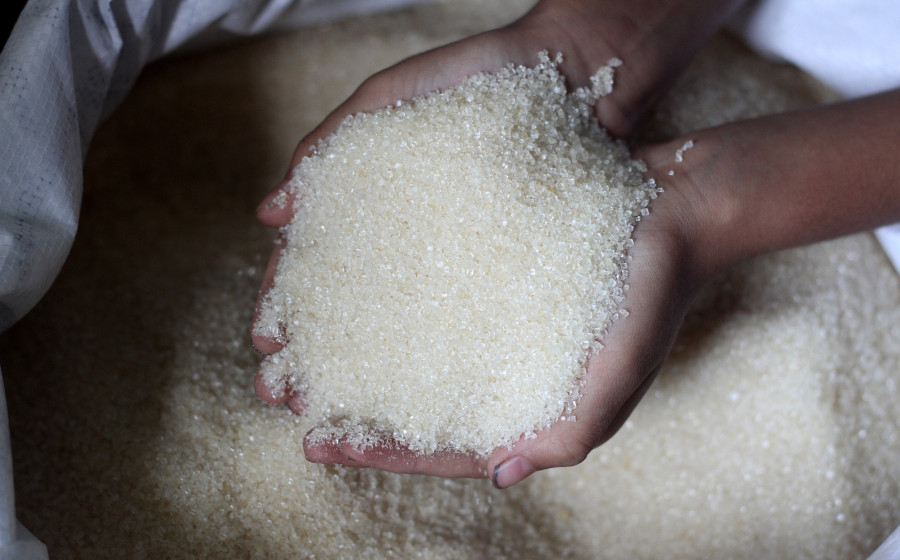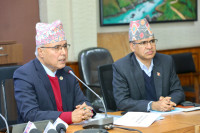Money
Sugar shortage hits Valley as festival season nears
The household sweetener cost Rs 72 per kg before the lockdown, and now the retail price has crossed Rs 100 per kg.
Krishana Prasain
Menuka Basnet scoured the Kalimati market for some sugar to stock up for the upcoming festivities, but couldn't find even a kilo to take home.
On Sunday, the Dakshinkali-resident travelled to Kalimati, one of the major grocery market hubs in the Kathmandu Valley, to do her festival shopping. She had planned to buy 4-5 kg of sugar to avoid having to go to the market with the Covid-19 pandemic raging.
“I visited many grocery shops, but could not find a single grain of sugar and had to return empty-handed,” said Basnet. Shopkeepers told her that sugar had become scarce after an increase in the price.
Kapil Muni Mainali, president of the Nepal Sugarcane Producers’ Association, told the Post that sugar mill owners in coordination with the government had imported 100,000 tonnes of sugar illegally with the intention of selling it at a high price.
Consumer rights activist Prem Lal Maharjan concurred, adding that the National Consumer Forum had filed a complaint over the illegal import of sugar with the Prime Minister's Office.
A market study done by the forum shows that 100,000 tonnes of sugar entered the country through illegal channels. “The illegal import of sugar helps fuel the black market,” Maharjan, president of the forum, told the Post. Traders have imported the sugar to sell it going against consumer rights, he said.
Sugar mills produced 140,000 tonnes of sugar in the fiscal year 2019-20 against the national requirement of 400,000 tonnes, said Mainali.
The government did not fix the price of sugar last year, and it increased this year, he added. According to him, sugar mills have around 3,000 tonnes of sugar in stock.
Consumer rights activists said that traders had created an artificial shortage in the market with the intention of hiking prices.
The household sweetener cost Rs72 per kg before the lockdown, and now the retail price has reached more than Rs100 per kg.
The Ministry of Industry, Commerce and Supplies issued a recommendation to import 50,000 tonnes of sugar, but the Ministry of Finance gave its approval for 30,000 tonnes only.
Out of this, Food Management Trading Company will be importing 10,000 tonnes and Salt Trading Corporation 20,000 tonnes. According to the government, it will take a month for the sugar to arrive in the market.
Sugar mill owners said that there would be a deficit of 30,000-40,000 tonnes of sugar and the country would have to turn to imports.
Despite being informed well in advance about an imminent shortage, lack of coordination between government agencies led to reduced supplies and increased prices, consumer rights activists said.
“The government is responsible for the price rise as this was caused by its failure to make timely decisions,” said Maharjan.
The nine sugar mills in Nepal produced 260,000 tonnes of sugar in the fiscal year 2014-15. Output has been declining annually, and reached 140,000 tonnes last year, said Mainali.
He said that the country was even able to export raw sugar to Europe in 2013-14, but now it depends on imports to meet its needs, and consumers are forced to shell out Rs100 for a kilo of sugar.
Consumer rights activists said that prices could go up further with traders eyeing increased demand during the nearing festival season which will last till Chhath.
Home maker Basnet said that sugar becomes dearer on different pretexts before the festival season every year. “I have to buy it, as a shortage like this will push up the price further,” she said.
According to government records, the country’s annual sugar requirement is 300,000 tonnes. Salt Trading Corporation, a government entity, supplies 25,000-30,000 tonnes of sugar every year.
The government targeted to become self-reliant in sugar within two years, but consumer rights activists said that dependency on imported sugar had been increasing annually. As sugarcane farmers are not being paid regularly for their harvests by mill owners, and they have to wait for many years to get their money, they are discouraged from growing it.
Maharjan said that sugar costs Rs32 per kg in India and Nepali consumers are paying more than Rs100 per kg.
A study done by the Department of Commerce, Supplies and Consumer Protection four years ago shows that the sugar mill owners have been importing sugar through illegal channels and selling it under a Nepali brand.
The forum also files complaints against sugar mill owners with the government for not buying sugarcane grown by local farmers and making sugar from it.
The government has time and again imposed policies that favour sugar producers in the name of safeguarding domestic industry. Despite being favoured by generous government policies, domestic sugar producers neither pay cane farmers on time nor keep sugar prices stable.
Analysts too believe that the government should look for alternative measures rather than imposing quantitative restrictions to protect domestic sugar factories.
There are 14 sugar industries in the country. Shreeram Sugar Mill of Rautahat closed down recently. It owes Rs250-260 million to cane farmers for their crops, Mainali said. Sugarcane farmers don't know if they will get their money with the company gone belly up.
Annapurna Sugar Mill owes Rs250-260 million to sugarcane farmers, Indira Sugar Mill Rs100-110 million and Lumbini Sugar Mill Rs10-12 million. Sugarcane farmers have not received a penny from them.




 15.12°C Kathmandu
15.12°C Kathmandu














